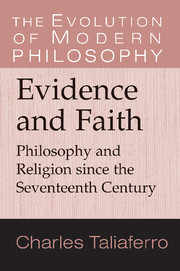Book contents
- Frontmatter
- Contents
- Acknowledgments
- Introduction
- 1 The Sovereignty of the Good in Seventeenth-Century Philosophy of Religion
- 2 Cartesian Philosophy of Religion
- 3 The Ascendancy of Rules of Evidence in Early Modern Philosophy of Religion
- 4 Humean Philosophy of Religion
- 5 Kantian Philosophy of Religion
- 6 Religion and the Philosophical Gods and Giants
- 7 Continental and Feminist Philosophy of Religion
- 8 Five Major Moves
- 9 Religions, Evidence, and Legitimacy
- Appendix A A Guide to Further Study
- Appendix B Select Contemporary Philosophers
- Select Bibliography
- Index
6 - Religion and the Philosophical Gods and Giants
Published online by Cambridge University Press: 15 December 2009
- Frontmatter
- Contents
- Acknowledgments
- Introduction
- 1 The Sovereignty of the Good in Seventeenth-Century Philosophy of Religion
- 2 Cartesian Philosophy of Religion
- 3 The Ascendancy of Rules of Evidence in Early Modern Philosophy of Religion
- 4 Humean Philosophy of Religion
- 5 Kantian Philosophy of Religion
- 6 Religion and the Philosophical Gods and Giants
- 7 Continental and Feminist Philosophy of Religion
- 8 Five Major Moves
- 9 Religions, Evidence, and Legitimacy
- Appendix A A Guide to Further Study
- Appendix B Select Contemporary Philosophers
- Select Bibliography
- Index
Summary
Stranger: What we shall see is something like a battle of gods and giants going on between them over their quarrel about reality.
Theaetetus: How so?
Stranger: One party is trying to drag everything down to earth out of heaven and the unseen, literally grasping rocks and trees in their hands, for they lay hold upon every stock and stone and strenuously affirm that real existence belongs only to that which can be handled and offers resistance to the touch. They define reality as the same thing as body, and as soon as one of the opposite party asserts that anything without a body is real, they are utterly contemptuous and will not listen to another word.
Theaetetus: The people you describe are certainly a formidable crew. I have met quite a number of them before now.
Stranger: Yes, and accordingly their adversaries are very wary in defending their position somewhere in the heights of the unseen, maintaining with all their force that true reality consists in certain intelligible and bodiless forms. In the clash of argument they shatter and pulverize those bodies which their opponents wield, and what those others allege to be true reality they call, not real being, but a sort of moving process of becoming. On this issue an interminable battle is always going on between the two camps.
PlatoIntelligence, Evidence, and Happiness
In Plato's dialogue, The Sophist, the philosophical battle over the world is depicted as warfare between the giants and the gods.
- Type
- Chapter
- Information
- Evidence and FaithPhilosophy and Religion since the Seventeenth Century, pp. 248 - 290Publisher: Cambridge University PressPrint publication year: 2005



